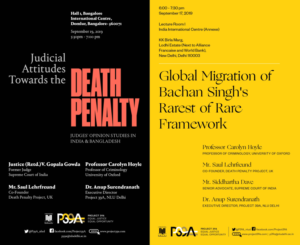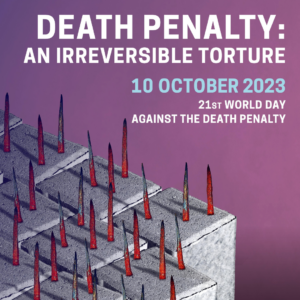
Capital sentencing and judicial attitudes towards the death penalty in India and Bangladesh
- News
- 17 Sep 2019
This week, in collaboration with Project 39A of the National Law University (Delhi), we will be travelling to Delhi and Bangalore with Professor Carolyn Hoyle (University of Oxford) and Dr. Mahbubur Rahman (University of Dhaka) to present at a series on events on capital sentencing practices and judicial attitudes towards the death penalty in India and Bangladesh. Watch the panel discussion here.
On Tuesday 17th of September, Project 39A will host a panel discussion on the ‘Global Migration of Bachan Singh’s Rarest of Rare Framework’. The pivotal 1980 case of Bachan Singh vs. State of Punjab saw the guidelines for imposing capital sentences in India defined, establishing the normative presumption in favour of life, and the death sentence as an exceptional measure. As a result, judicial discretion became guided towards weighing the mitigating and aggravating factors in any case, and prescribing the death penalty only in extraordinary circumstances. As a result, sentencing judges are required to undertake the comprehensive and nuanced task of balancing a wide range of factors within a sentencing framework that requires them to pass the death sentence in only the ‘rarest of rare’ cases, where the alternative option of life imprisonment is unquestionably foreclosed. The event in Delhi will focus on the migration of this principle and the restriction of the death penalty in line with international human rights law.
Whilst we know that no system of discretionary capital sentencing can erase subjectivity and arbitrariness from the administration of the death penalty in practice, a rigorous and structured approach can reduce the risk – and the ‘Rarest of Rare’ framework has been central to promoting such an approach, worldwide, over the past four decades. However, numerous investigations (including the Law Commission of India’s (2015) Report 262: The Death Penalty) have concluded that capital sentencing in India continues to suffer from ‘judge-centricity’ and arbitrariness. As such, this event will draw on practices from other Commonwealth jurisdictions that have adopted ‘Rarest of Rare’ but have additionally incorporated much needed practice guidelines and procedural/evidentiary safeguards to ensure a safer and more restrictive approach. Where they exist, such measures have ensured greater consistency in capital sentencing and have thereby reduced subjectivity (although not eliminated it entirely). By considering these issues in the Indian context and highlighting how other jurisdictions have reduced their impact, this event will seek to better understand how they can be mitigated, pending abolition, in India and other jurisdictions where they persist.
On Thursday 19th September, the Bangalore International Centre will host a panel on ‘Judicial Attitudes towards the Death Penalty: Judges’ Opinion Studies in India and Bangladesh’. The event will focus on points of comparison raised by two studies of judicial attitudes towards the death penalty – in India and Bangladesh. ‘Matters of Judgement: A judges’ opinion study on the death penalty and the criminal justice system’ (2017), which was published by Project 39A and undertaken in association with the Death Penalty Project, uncovered unprecedented insights into the complex and often troubling views of India’s most senior judges towards the death penalty and the administration of justice in India. The findings revealed an overwhelming sense of concern amongst judges, pointing to a crisis in India’s criminal justice system. A subsequent study of judicial attitudes towards capital punishment in Bangladesh by the University of Dhaka, ‘The Death Penalty in Bangladesh: Exploring Perspectives of Former Judges’ (forthcoming) has uncovered remarkably similar and concerning results.
The studies have provided fertile grounds for comparison, and an article authored by Professor Hoyle and Saul Lehrfreund (Co-Executive Director of the Death Penalty Project) will be published shortly. The panel in Bangalore will provide an invaluable opportunity to discuss these remarkable survey findings, analyse the results of each from a comparative perspective, and address the issues raised in both India and Bangladesh with an interested audience.



















